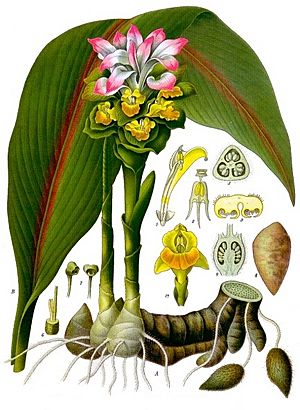Zedoary facts for kids
Quick facts for kids Zedoary |
|
|---|---|
 |
|
| Scientific classification | |
| Synonyms | |
|
Zedoary, also known as white turmeric, is a plant that belongs to the ginger family. It's a type of herb that grows year after year. This plant originally comes from places like South Asia and Southeast Asia. You can also find it growing naturally in other areas, such as Florida in the United States.
Long ago, zedoary was an important food plant for the Austronesian peoples. They helped spread it to the Pacific Islands and Madagascar thousands of years ago. Today, zedoary is not often used as a spice in Western countries. Other spices like ginger and yellow turmeric are much more common.
Contents
About the Zedoary Plant
Zedoary plants grow well in warm, wet forest areas. These are known as tropical and subtropical regions. The plant has a nice smell.
What Zedoary Looks Like
Its flowers are yellow and have red and green leaf-like parts called bracts. The part of the plant that grows underground is called a rhizome. This rhizome is large and has many branches. It looks a bit like a root. The leaves of the zedoary plant can grow quite tall, up to about 1 meter (3 feet) high.
How Zedoary is Used
Zedoary has several interesting uses. People use different parts of the plant for various things.
Zedoary in Food
The underground stem, or rhizome, of zedoary can be eaten. Inside, it is white and smells a bit like mango. However, its taste is more like ginger, but it has a slightly bitter taste afterward.
In Indonesia, zedoary is often ground into a powder. This powder is then added to make white curry pastes. In India, people tend to use it fresh or for pickling foods. In Thai cuisine, zedoary is sometimes eaten raw. It can be cut into thin strips and added to certain Thai salads. It is also served in thin slices with other herbs and vegetables alongside some types of nam phrik (Thai chili pastes). It is also used in India to flavor dals (lentil dishes) and chutneys.
Zedoary as a Houseplant
The zedoary plant has pretty flowers and leaves. Because of its attractive look, it is sometimes grown as a houseplant inside homes.
Zedoary in Traditional Medicine
For a long time, zedoary has been used in traditional medicine. People have used it to help with things like discomfort and to soothe skin issues. It has also been used to help with general well-being.
Other Uses of Zedoary
The dried underground stems of zedoary can be used to make an essential oil. This oil is used in perfumes and to make soap. It can also be an ingredient in some bitter-tasting health tonics.
Images for kids
See also
 In Spanish: Tamoilán de Filipinas para niños
In Spanish: Tamoilán de Filipinas para niños


